Will Hedgehogs Give Fleas to My Pets?
This one is easy - no, they can’t.
Hedgehogs often have fleas. Studies say the average hog will have around 100 fleas living on him with no ill effects.
But these fleas are Archaeopsylla Erinacei. They are host specific hedgehog fleas and will not live or breed on other animals or humans.
There is no reason to be concerned about your pets catching fleas from hedgehogs.
A Bit About Hedgehog Fleas
If you think of the hedgehog as archeaopsylla erinacei’s natural environment and compare this to the environment offered by a dog or cat it’s not surprising that the hedgehog flea doesn’t travel.
Pat Morris, in his book Hedgehogs, describes how a hedgehog offers wide-open spaces of thick bare skin, between well-spaced spines and coarse fur. The hedgehog flea is specially adapted to run around in these. It has longer legs and a thinner, smoother body than many other fleas.

Put a hedgehog flea into the soft, warm, thick coat of an average dog or cat, and it will immediately feel out of place. Cat and dog fleas are adapted to cling to thick fur. The hedgehog flea doesn’t have this adaptation and will quickly drop off.
Hedgehog fleas don’t breed on the animal; they breed in the nest. So if you are over-wintering autumn juveniles, or have a hedgehog nest in your home for any other reason, it’s a good idea to change the bedding frequently, to get rid of any unwanted visitors.
There is an old myth that hedgehogs need their fleas and that they would die without them. This is pure myth—many hedgehog rescuers de-flea their hogs on taking them in, with no ill effects.
And although the European hedgehog was successfully introduced into New Zealand, there are no hedgehog fleas over there. It’s thought that they may have died out on the voyage over.
Though fleas aren’t essential to a particular hog, there is now speculation about whether they may have benefits for the species. As they breed in the nest, originating on the mother and passing to the young, experts are wondering whether they may pass certain immunities down the generations. But at this stage it is just wondering, there have been no studies yet.
One last fascinating fact about hedgehog fleas. They live on hedgehog blood, like all fleas. Sometimes, especially in the summer, they get a digestive problem which means they regurgitate the blood all over the hogs spines. This is why you will occasionally see a hedgehog who is covered in blood but has no injuries at all. He’s not come off best in a nasty fight. His fleas have just got upset stomachs!
Will Hedgehog Fleas Bite Pets or People?
Oh yes! I once spent an evening sitting in the garden. Unknown to me until I moved, a hedgehog had been sitting under my chair. My legs and ankles were bitten to death. Very itchy for a little while, but no lasting damage was done.
So yes, hedgehog fleas will bite your pets given the chance or even you. But beyond it being irritating, there is nothing to worry about.
You would wear gloves to pick up a hedgehog anyway, but avoiding flea bites is another good reason to do this.
What About Ticks?
Though hedgehog fleas are not a threat to your pet, hedgehog ticks can be, along with several other species of tick common in the UK, especially the Sheep Tick.
What Are Ticks?
Ticks are a member of the spider family. They are parasites, living on the blood of other creatures. There are many varieties around the world and at least four common types in the UK, including the hedgehog tick.
They tend to be grey or brown in colour and oval shape. Though they are very small when “empty” a fully fed tick can swell to the size of a small pea.

Why Are Ticks a Problem?
Ticks feed by burying their mouthparts in their host animal sucking blood. They can stay attached for six or seven days, only letting go when they are full.
This sounds horrible, but actually, tick bites don’t hurt, or itch like flea bites. Often a person or animal will not know they have a tick.
But their bites do spread disease. Because they embed their mouthparts in the host. If a tick has been feeding on an animal with a disease or infection, it can easily spread that disease to the next host.
Ticks can carry a wide range of diseases and infections, but the most common in the UK is Lyme Disease. This can be debilitating and painful in animals and people.
How Would Hedgehog Ticks get Onto My Pet?
Unlike the flea, who can jump over 100 times their body height, ticks aren’t great athletes. They can’t jump or fly.
Ticks tend to drop off their hosts when they are full. With hedgehogs, they tend to drop off as the temperature falls, which is often just as the hog goes out foraging in the evening.
When they are not attached to an animal, ticks need to be sure not to dry out, which is fatal for them. So they tend to be found in damp, shaded areas. Woodland, long grass, hedgerows, or your shrubbery or flower borders would be perfect.
When they are ready to feed again, they will climb to the top of a blade of grass, or other vegetation. They wait for another animal to brush by. They then grab on and burrow into its fur. They may spend quite a while looking around for a good spot to feed before attaching. As well as attaching with their mouthparts may also secrete a sticky substance that helps them to cling on.

So if your dog or cat were close to a hedgehog feeding on your lawn, for example, they wouldn’t catch ticks from the hedgehog. But if your pet was nosing about under the hedge, or in the long grass that a hedgehog had recently passed through, then they could pick up a hedgehog tick, or any other kind of tick.
How Can I Stop Ticks Becoming a Problem For My Pets?
Well, keeping them away from hedgehogs isn’t going to solve the problem as the hedgehog tick is just one of many in the UK.
Keeping them out of long grass and vegetation might help. But it doesn’t sound like much fun for your pet.
But there are plenty of easy steps you can take to ensure ticks don’t become a problem for your pet.
Regular brushing. Ticks take some time to attach, so if you brush your pet regularly, especially after they have been out, you may well be able to stop ticks from settling in.
Checking for ticks. It may be quite difficult to see ticks on your pet, especially before they start to feed. But you should be able to feel for them. Check over especially the ears, chest, belly and legs.
Remove Safely. We hear so many horror stories about ticks that it may be tempting just to pull them off if you find one. Don’t do that! Removing a tick incorrectly can cause more problems than leaving it be. A stressed tick can regurgitate blood back into your pet, or leave its mouthparts behind. Both increase the risk of infection. So don’t use tweezers to pull them out, burn them or cover them in Vaseline. There are several tick-removing devices on the market. They are easy to use. Remember to keep a covered container to hand to put the tick in once you have it.
Get a tick collar. If prevention seems like a better idea, there are also plenty of effective tick collars and tick treatments on the market that you could try.
Conclusion
Hedgehogs will not give fleas to your pets. Hedgehog fleas are host specific and can only leave on hedgehogs.
Hedgehog ticks, on the other hand, will target your pets along with all the other species of tick in the UK. But ticks can’t jump or fly. So your pet is not likely to pick up ticks directly from hogs in your garden. They pick them up from brushing past vegetation where a tick has fallen.
Ticks of any sort can spread diseases to your pets. So it’s essential to know how to spot them and how to remove them safely.
We hope you have found this post useful and interesting. If you have a question or story, we would love to hear it. Leave us a comment below.
And if you are keen to find out more about hedgehogs, check out our hedgehog library here.

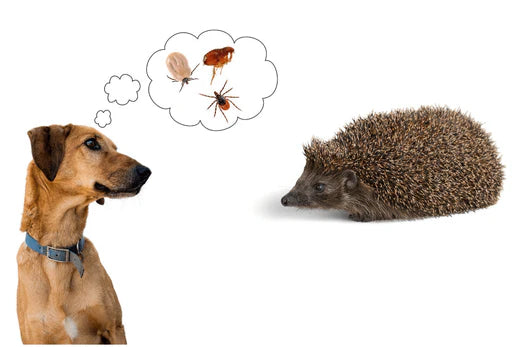
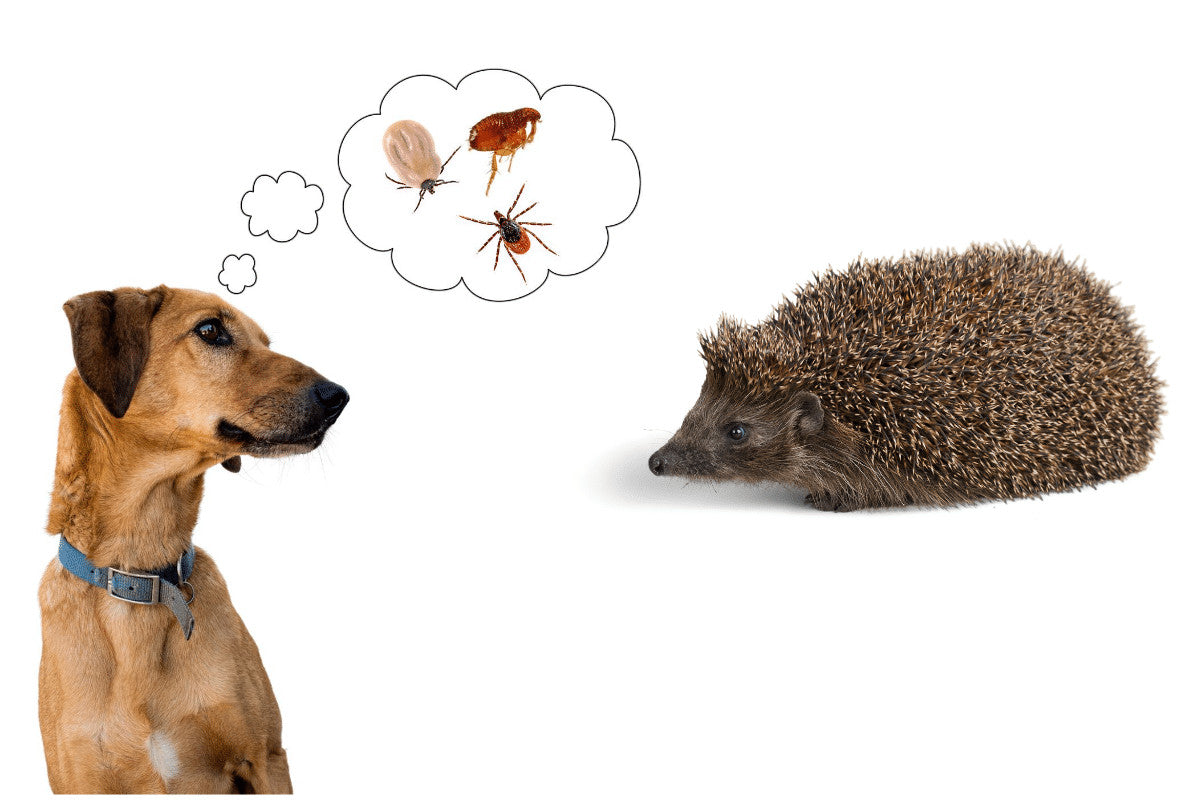



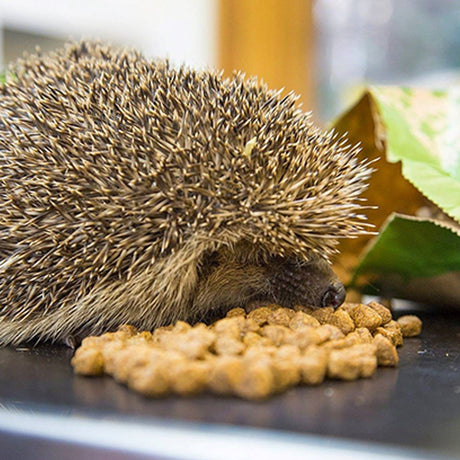
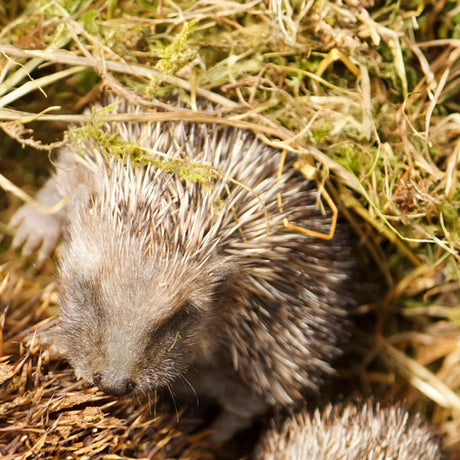


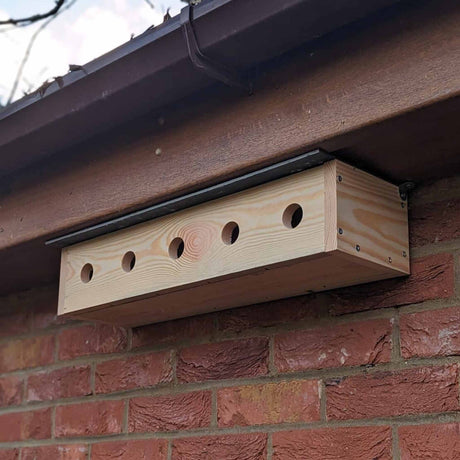

2 comments
Hello Yesterday I saw my pupoy shaking somrthing in her mouth it turned out to be part of a hedge hog coat/skin with sll the quils still attached . My pupoy looked as if she had small short broken pueces of quil enbedded in her face LOTS . I took her to the vet who removed a lot if thrm BUT NOT ALL AS PUPOY WAS WIGGLING TOO MUCH
THE CER SAID THESE WERE FLEAS? ? ir ticks she gave puppy anti fleas /tick medecine and said it takes up to 2 days to work – IS THIS POSSIBLE ? puppy still has several black dots still attached . I am uneasy cos I did not think fleas or tick were that small what should i do ? Maureen gwmaureen@ gmail.com thank you for any suggestions
Hi Jane,
Sorry if this is unclear. I wasn’t suggesting that you should attempt to remove ticks from hedgehogs. The advice in the article is on how to remove ticks from pets. I will take a look and see if it needs an edit for clarity.
Best Wishes.
Clare